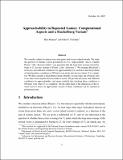Approachability in repeated games: Computational aspects and a Stackelberg variant
Author(s)
Mannor, Shie; Tsitsiklis, John N.
DownloadMannor+JNT-approachability.pdf (176.8Kb)
PUBLISHER_POLICY
Publisher Policy
Article is made available in accordance with the publisher's policy and may be subject to US copyright law. Please refer to the publisher's site for terms of use.
Terms of use
Metadata
Show full item recordAbstract
We consider a finite two-player zero-sum game with vector-valued rewards. We study the question of whether a given polyhedral set D is “approachable,” that is, whether Player 1 (the “decision maker”) can guarantee that the long-term average reward belongs to D, for any strategy of Player 2 (the “adversary”). We examine Blackwell's necessary and sufficient conditions for approachability, and show that the problem of checking these conditions is NP-hard, even in the special case where D is a singleton. We then consider a Stackelberg variant whereby, at each stage, the adversary gets to act after observing the decision maker's action. We provide necessary and sufficient conditions for approachability, and again establish that checking these conditions is NP-hard, even when D is a singleton. On the other hand, if the dimension of the reward vector is fixed, an approximate version of these conditions can be checked in polynomial time.
Date issued
2008-04Department
Massachusetts Institute of Technology. Department of Electrical Engineering and Computer Science; Massachusetts Institute of Technology. Laboratory for Information and Decision SystemsJournal
Games and Economic Behavior
Publisher
Elsevier
Citation
Mannor, Shie, and John N. Tsitsiklis. “Approachability in repeated games: Computational aspects and a Stackelberg variant.” Games and Economic Behavior 66.1 (2009): 315-325.
Version: Author's final manuscript
ISSN
0899-8256